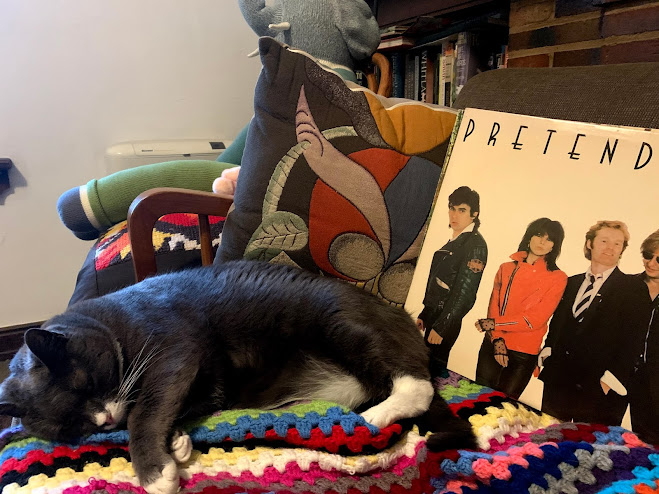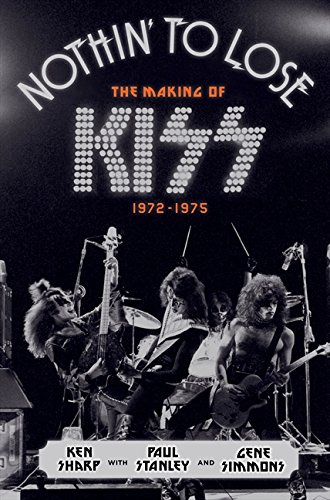These three LPs came in the mail today from a Danish supplier. One reason I like getting records in the mail is the way in which it is very similar to someone curating albums I might like because of course by the time I get them I've forgotten what I have ordered. Pretenders is an outlier here because I have owned this album since it came out but I needed to replace my scratched up copy (but, a la Wild Planet, I still don't have, but really want, Pretenders II).
NY Daily News 18 September 2005
I have been a big fan of Skaldowie for decades but only by dint of one album of theirs I bought probably more than twenty years ago at that weird second hand shop in Smith Street that then became a hairdresser. I can't understand why more people don't love them (I imagine if they had recorded in English that might have been a plus for their appeal outside Poland/ Polish speakers: the titles are translated, for no good reason, into English and that's what I'll be referring to henceforth). They did record in German occasionally, the only other record I have of theirs is a 7" EP in German. The album I have had all this time is Cała Jesteś W Skowronkach which google translate tells me means 'You're all in the larks', obviously I'm missing something there. This one is called Ty, which means 'you', I think singular 'you' (because it also means 'thou').
Knowing precisely 0 about the group except they are from Krakow, a city I have spent about 24 hours in and which I enjoyed greatly and would like to see more of one day, and speaking absolutely 0 Polish, I found myself rather regretful when wiping presumably 50 years of fingerprints off the vinyl before playing Ty, and thinking of course if only those fingerprints could talk about what the eyes of the people who bore the fingers who made them (the prints) had seen. However, in the meantime I will just be satisfied with the wonderful rich bass sound of this record, hollow and wandering not entirely unlike the sound Carol Kaye made her own on (for instance) Pet Sounds, and the solidly simple drums, and the virtuosity of a group with one foot in folk, no doubt hamstrung as far as what it could 'really' sing 'about', almost certainly hearing some music from the broader zeitgeist but, like the Australians of the period, getting on with their own thing and not letting anyone's perception of the supposed superiority of the Stones or Carnaby Street or, I don't know, Woodstock cow them.
Side one is a fine bunch of pop songs in a late 60s style. Had anyone had the slightest imagination (actually it's not really a matter of imagination - more like, lack of imagination) they should have been translating things like 'Yearning', dreamy pop a la Jimmy Webb with a little bit of dour chanting to boot, and shopping it around to the aspirant next-gen Harry Nilssons and Glenn Campbells of the era. I daresay Tin Pan Alley, or whatever the LA equivalent was, had enough cheap 'n' cheerful songsmiths as it was, but then again, a hit's a hit and 'Yearning' had hit written all over it. Barbara Streisand would have done wonders with it. As for the soft-shoe silliness of 'Hymn of the Narrow-Gauge Railway Workers', well... to be honest musically it would have fit pretty nicely on something like the Bee Gees' Odessa, except probably better than most of that album, and the Bee Gees, whatever their strengths, would not have thought up something as dinky as the 'Girl from Ipanema'-style ending.
Side two grabs me in greater detail. It starts with a piano-based pop song called 'A Man is Born' with a 'Hallelujah' in the chorus which makes me assume that it has a religious aspect to it. It also has french horn, chanting, organ, and the sound of a baby crying in it in which at first sounds like... something was really broken, which might be the point? Don't know. I get a little kick out of a group in cold war Poland getting away with what seems to be a song about Jesus, although at the same time, I am not very interested in regarding Christianity much less Catholicism as anything radical. Things pick up from here: 'You' i.e. the title track is a light jazzy pop song with a fabulous very punchy, balloony drum sound in the verse which I really think a lot of groups then and since would kill for. However, I have to say it's the funky 'At Railway Stations All Over the World' which really makes this side. It's not idiotic to describe it as evocative of a Monkees track I'll remember soon enough (um, possibly 'Tear Drop City') and perhaps a bit of 'The Beat Goes On'; clearly the verse is meant to evoke a railway train, an old trick (probably old even in 1970) but done well, the outcome is pretty grand, and these guys are clearly tight players as well - whoever plays the keyboards is really Keith Emersoning it up at the end and it's sensational, and just drums, bass and keys go for a bit of a crazy loop before the whole comes to the end. (In case I haven't made it clear, I'm not really saying that Skaldowie are imitating anyone, it's at worst the zeitgeist, at best their own creative genius). 'The Last Scene', a bit of a folk-rock opera, adds a massive slavic bass line to some gentle if disturbing harp and a classic example of Beach Boysesque balladeering which I have to say (viz mentions of Carol Kaye above) is a real element of the Skaldowie sound, and then, um, of course - a truck driving away (!?). The last track is 'Epilogue', which true to the times ends in mad tape-speeding-up craziness, is a bit of a frenetic bit of hilarity as is and you can sort of imagine this knockin' then dead at the Krakow clubs while smileless guards watch on from the surrounding dark corners. 

It seems that in the late 1970s
Rolling Stone magazine supplied a syndicated column to newspapers, 'hence why' (as they say) when you search for Deaf School's third album on newspapers.com this same review appears a billion times, though only once I think (here, in the
Ithaca Journal 27 May 1978) zanily crediting the record to 'Dear School'.
To tell the truth, on early listenings (I will keep trying I think) English Boys/Working Girls is a bit of a disappointment after Don't Stop the World, which I love, having bought it on spec from a good record shop in Preston for cheap. EB/WG is the third Deaf School album (DSTW the second) and I guess by 1978 the band might have been thinking, well, who are we and what do we do exactly? There were way too many members (8) and probably also just too many ideas, if that's possible, and I think it might be, particularly when another big pervasive idea is 'crazy intellectuals can't new wave'. God it must have been difficult and I guess this is the kind of problem Split Enz had (but got over, somehow).
Listening to English Boys/Working Girls you get a strong sense of the kind of showmanship that must have been a big part of Deaf School; a whole lot of guff going on at once, seemingly everyone doing their own thing, then sometimes they would click into unison and you'd realise it was all rehearsed.
Songs like 'All Queued Up' are totally of the moment (the 1978 moment), and could be Blondie or, um, something off the Starstruck soundtrack or... well, the moment, and it was quite a moment. The sound of people who thought things were going to be better by now. Partying till they drop the atom bomb (I was talking to someone much older than me last week btw who mentioned how despairing his grandchildren were about the future because of the environment - I didn't quite say it right but I sort of said - jeepers, everyone who was sentient before 1990 had the same kind of despair re: nuclear annihlation I'm sure). (Actually both - the atom bomb and the environment). (And it's not like the atom bomb has gone away, but no-one thinks about it anymore except regarding Donald Trump and he's gone (for) now).
'I Wanna Be Your Boy' is one of those songs that just goes everywhere, three directions at once like the Marx Brothers all in a huge suit. What Deaf School clearly 'needed' (though I'm glad they didn't get it) was a producer who took their songs apart and said no, don't do this bit, just concentrate on this amazing riff, and forget trying to make the song some kind of 3D hologram of an explosion. (Oddly enough the producer was Mutt Lange, who went on to work with people whose music wasn't complex, like AC/DC and Def Leppard).
So that's my assessment of English Boys/Working Girls. Too many people in the band, too many ideas in the songs, funnily enough not a problem with Don't Stop the World. A long time ago I had an idea for a kind of, I don't know, studio group who would take whole albums that were considered problematic for significant artists (I guess things like Their Satanic Majesties), and remake/repair them (basically, rerecord them, but show how they could be made to work). A thoroughly 'academic' exercise that no-one would have time for in the real world, but it did appeal. If I were to do that to this album every song would be three songs. It would be a triple album. Tell you what though, the last song ('O. Blow') really tells you everything you need to know about where Madness found significant support for their sound/style.
 Which leaves us with Pretenders. Serious?! I don't want to listen to this album now. It does have four of the best songs of 1980 though, hands down: 'Precious', 'Private Life', 'Mystery Achievement' and 'Up the Neck'. Wow! Not to mention 'Brass in Pocket' which I guess 41 years ago for all I know today I spent a day going from radio station to radio station on a little transistor radio hoping one of them would play it. Maybe if I drink a bit more of this Salmiakki I'll play side 1 (but I'll yank it off before that fucking 'Space Invaders' track, what a dog).
Which leaves us with Pretenders. Serious?! I don't want to listen to this album now. It does have four of the best songs of 1980 though, hands down: 'Precious', 'Private Life', 'Mystery Achievement' and 'Up the Neck'. Wow! Not to mention 'Brass in Pocket' which I guess 41 years ago for all I know today I spent a day going from radio station to radio station on a little transistor radio hoping one of them would play it. Maybe if I drink a bit more of this Salmiakki I'll play side 1 (but I'll yank it off before that fucking 'Space Invaders' track, what a dog).





























